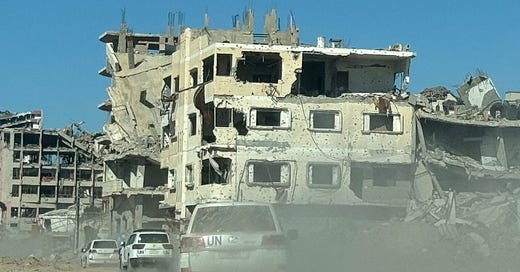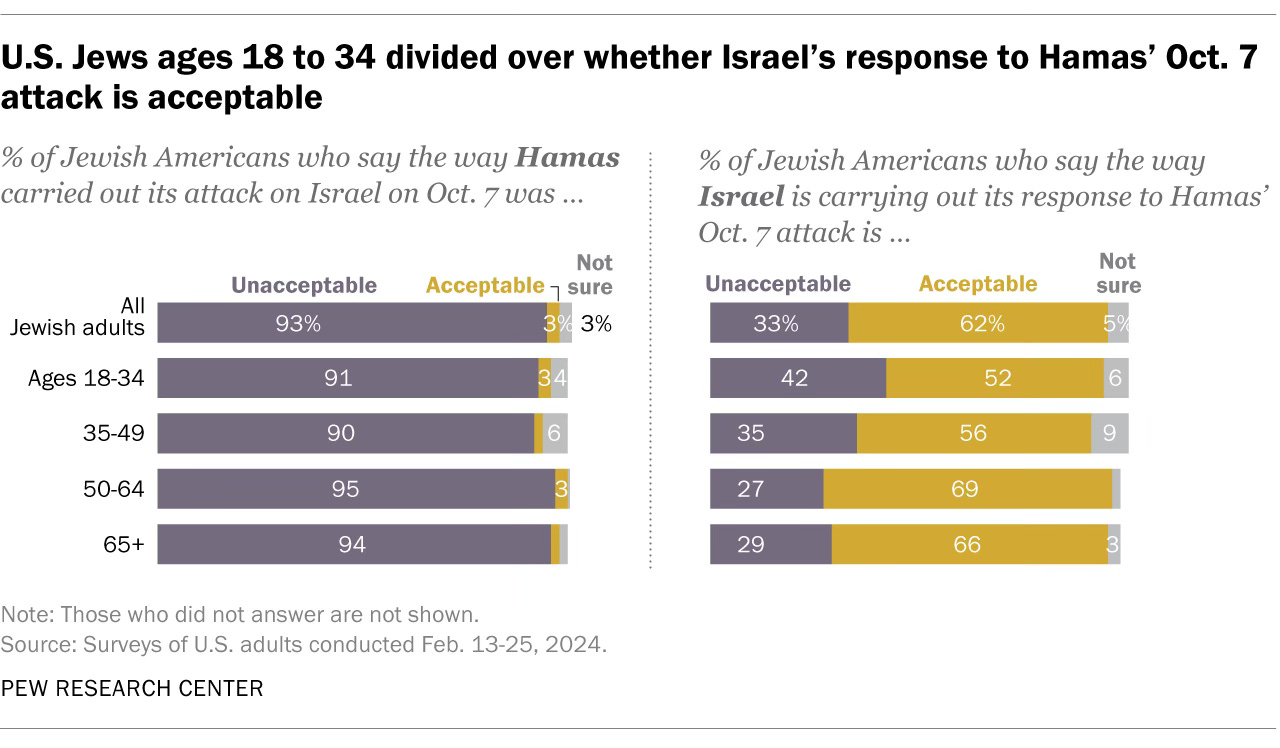Forced displacement. Starvation. The demolition of housing, schools, hospitals. What we are witnessing, says Human Rights Watch, is “a deliberate attempt by the Israeli authorities to create conditions that will make returning not just difficult, but impossible for many Palestinians.”
We are more than 400 days into Israel’s war against the people of Gaza, a war that has displaced about 90% of the 2 million or so residents of the Gaza Strip and left 43,700 dead, a war that Israel says it is waging in defense but that most object observers say amounts to ethnic cleansing and, yes, genocide.
It’s time for this to end, for Israel to realize that this kind of violence is both counterproductive and deeply immoral — though the Israeli government doesn’t seem to care. It views its mission as eradication and annexation, as Ben Reiff reports. And it has had U.S. support throughout this war and in the years leading up to it, years in which Israel has ratcheted up the repression. As an American and a Jew, I feel like that makes me doubly responsible — it is my tax dollars being spent on violence that is being conducted in my name. It’s why I support the BDS movement — Boycott, Divestment, Sanction of Israel.
I get that I am not in the mainstream of American Jews on this issue, at least not according to data from the Pew Research Center:
Around nine-in-ten U.S. Jews (89%) express a favorable view of the Israeli people, and 54% have a favorable view of the Israeli government. Jews are far more likely than the broader U.S. public to have a favorable view of the Israeli people (89% vs. 64%) and are also more likely than Americans overall to express a favorable opinion of Israel’s government (54% vs. 41%).
These numbers have remained rather constant since the Oct. 7 Hamas terrorist attack (no, I do not support Hamas and I do view Oct. 7 as a war crime), partly because the coverage of the war has been spotty or biased, but also because we have grown immune in the United States to horrors unleashed on others. Consider the report issued today by a special U.N. committee on Israel and Palestine. As reported in The Guardian, the committee “has said that Israeli policies and practices in Gaza are ‘consistent with the characteristics of genocide.’”
The committee, set up in 1968 to monitor the Israeli occupation, also said in its annual report that there were serious concerns that Israel was “using starvation as a weapon of war” in the 13-month-old conflict, and was running an “apartheid system” in the West Bank, including East Jerusalem.
Two words of note: genocide and apartheid. Israel, the report argues, is engaged in a systematic slaughter of a specific ethnic group for the purpose, at the very least, of removing them from their land if not wiping them out entirely. Israel has leveled Gaza, and has essentially chased fleeing residents from safe haven to safe haven. The numbers do not lie, nor do the pictures. Israel has blocked aid or made it nearly impossible to provide it, and the Gaza Strip is facing cascading crises, including famine and the return of long-eradicated diseases.
It also is and has been an apartheid state, in ways that mirror South Africa before the divestment movement gained momentum and forced real change. Israel operates as a tiered society in which Jewish Israelis are afforded full citizenship, and Palestinian and Arab Israelis face a series of hurdles — and this does not take into account the denial of any rights to Palestinians in the Occupied Territories.
The genesis of the two systems may be different — South African apartheid grew from a more traditional form of colonialism, based purely on the racist notion of African savagery. The racism was always the point, and the only point.
Israeli apartheid differs, not in its practical application, but in its justifications — and the ways in which its supporters have marshaled Jewish history to obscure the realities of the actual history, the racist assumptions of “Jewish Supremacy,” and the ongoing erasure of Palestinians as a people.
Political Zionism (to borrow from Martin Luther King Jr.) is a three-legged stool based on a commitment to a Jewish ethno-state, Jewish Supremacy, and anti-Arab racism that is part of the larger culture. We can pretend these things do not exist, remove one of these legs and the stool falls.
The first leg — the necessity for a Jewish ethno-state — is tied to the Jewish experience of European antisemitism and anti-Jewish violence. This history has been weaponized by the most hardcore political Zionists and internalized by most Jews to the point where they do not question the underlying assumptions. The argument — made by Theodore Herzl and others — that Jews could not be safe in non-Jewish spaces, that Europe was hostile to the Jewish people, was valid at that time. The repeated pogroms across Russian-controlled spaces, and the descent of Europe into fascism with Jews as a particular target only lent credibility to an argument that still resonates.
But the leap from these threats to the need for home of our own, separate from others, has lead us down a dangerous path. Ethno-states, by their definition, are anti-democratic, because they are based on ethnic supremacy and protections. As Jews began migrating to Palestine in the nineteenth century, they brought these ideas with them, along with the ingrained colonialism that governed world politics — including deeply held racist attitudes toward Palestine’s native population, which included not just Palestinian Arabs, but Bedouins, Christians, and Mizrahi Jews. The new settlers saw themselves as a superior lot and Palestine as a vacant or underutilized land. They tolerated their neighbors, but not as equals. These early settlers were overwhelmingly secular, but they also saw themselves as redeemers and the embodiment of the Biblical claim on the land and that Jews were a special, “chosen” people.
This mythology — underscored by Leon Uris in Exodus — drives much support within the mainstream Jewish community, and it drives the push for an expanded definition of antisemitism to allow critics of Israel to be tarred as antisemites, and why so much of the Jewish community is suspicious of BDS and supportive of the current iteration of the war, especially as it plays out in the mainstream press and the way the Palestinian narrative — as a Nakba, or catastrophe in which Israeli terrorists chased hundreds of thousands from their land — is dismissed.
There also is an undercurrent of racism against Palestinians, as a people. Remember the Pew polling? It also found this:
Four-in-ten American Jews have a favorable view of the Palestinian people – somewhat lower than the 50% of Americans overall who say the same. Very few Jewish Americans have a favorable opinion of Hamas, which has controlled Gaza, or the Palestinian Authority, which controls the West Bank (3% and 12%, respectively).
Four in 10 have a favorable view. That means six in 10 either have a negative view or no view — not of Hamas, but of Palestinians as a whole. Sadly, the numbers on Palestinian views of Jews are worse, but that’s a different discussion and should not be a justification for the anti-Palestinian racism, which often is expressed in casual language. “All they understand is force.” The Jews reclaimed the land, or turned a wasteland — a loaded word that assumes western-style development is the only goal and that the repression imposed by the British government on the Palestinian Mandate didn’t have an economic impact on Palestinians — into a paradise.
The ADL (formerly the Anti-Defamation League of the B’nai Brith), which portrays itself as the chief defender of Jews around the globe, is a chief purveyor of this anti-Palestinian racism. The ADL describes the Nakba as a myth, describing Palestinian use of Nakba “to insinuate that the very existence of Israel is a catastrophe and to question the legitimacy of Israel as the Jewish national homeland.” This is not disagreement over analysis but a dismissal of Palestinian intellectual and emotional autonomy.
Word choice creates meaning, as I tell my students, as does the choice of detail and fact. In this case, the use of the word “insinuate” does a lot of work, implying that the Palestinians were engaged in a nefarious effort to create a false narrative and not a heartfelt sense of having been forced into diaspora. What the ADL is saying is that Palestinian desires are antisemitic and illegitimate — an argument based on the ADL’s conflation of Jews with Israel. ADL defines Zionism “as the movement for Jewish self-determination and statehood in Israel, the Jewish people’s historic homeland,” and central to “Jewish identity.” So,
Labelling Zionism and Zionists as inherently nefarious has the antisemitic impact of denigrating and stigmatizing the vast majority of Jews.
Sol Stern, in the conservative City Journal, describes the Nakba as the “heart of the Palestinians’ backward-looking national narrative, which depicts the creation of the State of Israel in 1948 as the original sin that dispossessed the land’s native people.” His language is dismissive, the Nakba is “legend,” supporters of Palestinians are part an “international coalition of leftists that celebrates the Palestinians as the quintessential Other, the last victims of Western racism and colonialism.” He then criticizes a Palestinian “right of return” — which is no different than the Jewish right of return — as “suicide for Israel as a Jewish state.” It’s A demographic argument dressed up as a moral one.
The moral argument is simple: The original argument for this war was always based on a lie. It was sold as defensive, but it was and has always been an effort to “cleanse” the land of Palestinians— an argument built on decades of distortions and myth. Israel has.ceded what little benefit of doubt it had. It is not and has never truly been a moral actor.





